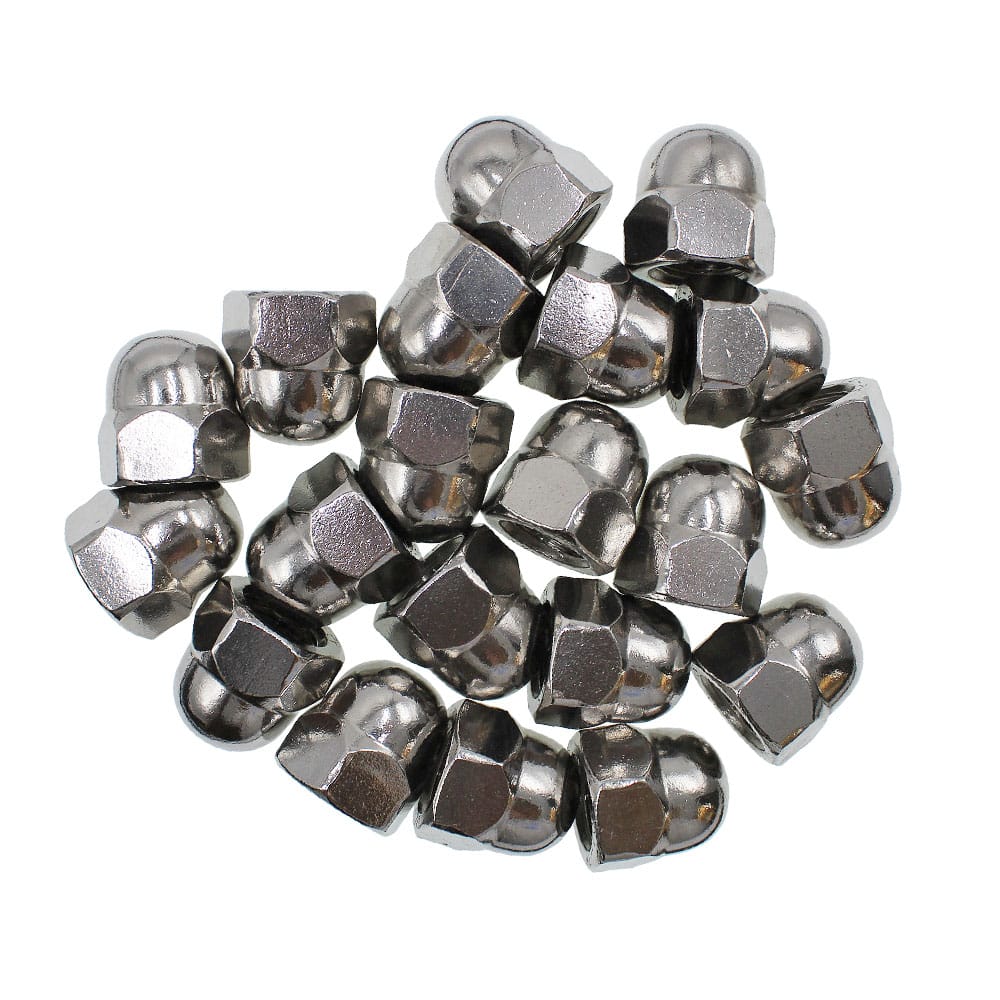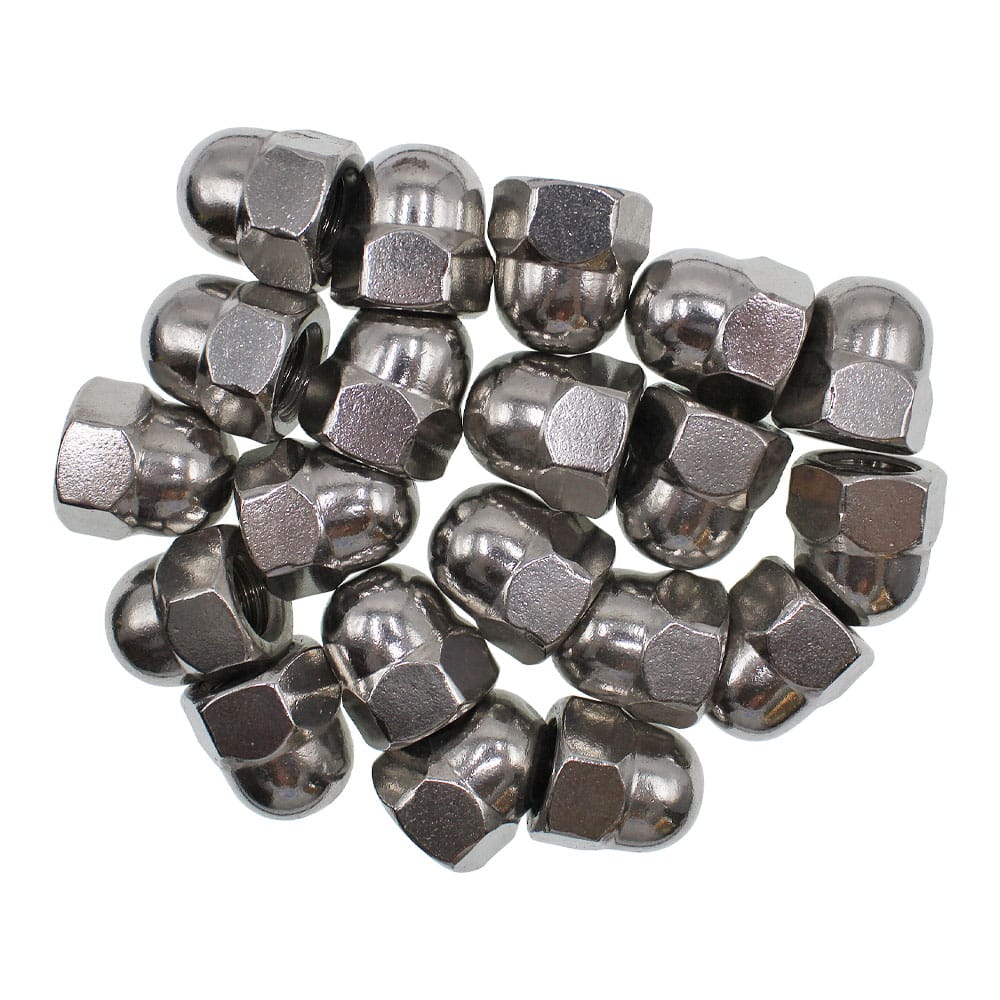- Massive Range
- FREE UK Delivery
- Rapid Dispatch
- Massive Range
- FREE UK Delivery
- Rapid Dispatch
- Massive Range
- FREE UK Delivery
- Rapid Dispatch
£10.99 – £19.99 inc VAT


This website is secured:
£ MULTIBUY SAVINGS – Order 3 For 10% Off
✔ Specialists In Rapid Shipments Of Any Size
✔ FREE UK Delivery Included
✔ Immediate Express Dispatch From Stock
✔ Tracked Delivery with Order Updates
✔ 30-Day Returns Accepted
@ ☏ Larger Pack Quantities Available
Are you on the lookout for some hardware that is not only durable but also versatile? Look no further than the M8 Dome Head Cup Nut A2 Stainless Dome Nuts from Speciality Metals. Constructed with 304 grade stainless steel, these dome nuts are the perfect solution for those seeking low maintenance hardware that stands the test of time. Not only are they designed to be corrosion-resistant, but they also provide a secure fix for whatever project you’re working on. Trust us, these stainless dome nuts will not disappoint.

Top quality stainless dome nuts supplied straight from Warrington, UK.
The M8 (8mm) Dome Head Cup Nut A2 Stainless Dome Nuts from Speciality Metals are the perfect fastener if you’re looking for a durable and versatile product. Made from stainless steel 304 grade, these dome nuts are highly corrosion-resistant and will keep their appearance and function for years to come. Furthermore, these nuts provide incredibly strong security, making them ideal for a variety of applications. For those looking for a reliable and long-lasting solution, these dome nuts are the perfect choice. No matter what kind of fastener you need, stainless dome nuts from Speciality Metals are sure to satisfy.
Standard nuts are not as aesthetically pleasing as dome nuts.
Key product details:
Speciality Metals are the best suppliers for you because:
Speciality Metals is a trusted UK based distributor of fasteners, sheet metal, flat bar and round tube. We specialise in rapid delivery to any location around the country. Our team of experienced, friendly staff are at hand at all times to process your order.
The compatibility of Stainless Steel 304 dome nuts with other metals largely depends on the environmental conditions and the metals in question.
Galvanic Corrosion: When dissimilar metals are in contact and exposed to an electrolyte (like water), galvanic corrosion can occur. Stainless steel is relatively noble in the galvanic series, so it’s less likely to corrode than many other metals. However, it can accelerate the corrosion of less noble metals when they are in direct contact.
Environmental Conditions: The risk of galvanic corrosion increases in environments that are more conductive, such as saltwater or acidic conditions. In such cases, it’s advisable to use similar metals or to isolate dissimilar metals using non-conductive materials like rubber or plastic washers.
Aluminum: When stainless steel and aluminum are in direct contact, aluminum is more likely to corrode. If you need to use these metals together, using an insulating layer or barrier like a rubber washer can be helpful.
Copper and Brass: Stainless steel is generally compatible with copper and brass, but the risk of galvanic corrosion still exists, especially in moist or wet conditions. Again, insulating layers can be beneficial.
Coated Metals: If the other metal is coated with a protective layer like zinc (galvanised steel), the coating can provide some level of protection against galvanic corrosion. However, if the coating is scratched or worn away, exposing the underlying metal, then corrosion can occur rapidly.
Engineering Consultation: For critical applications, especially those in corrosive or otherwise challenging environments, it’s advisable to consult with materials engineers to assess compatibility.
Specialised Coatings: Some anti-corrosion coatings or platings can be applied to either the stainless steel nuts or the other metal components to reduce the risk of galvanic corrosion.
Periodic Inspection: If dissimilar metals must be used together, periodic inspection is advisable to check for signs of corrosion or other forms of degradation.
Stainless Steel 304 dome nuts can be used with plastic components, but several factors need to be carefully considered. These include ensuring that the plastic is chemically compatible with stainless steel to avoid any reactions that might degrade either material. It’s also important to be cautious when tightening the nut onto plastic threads, as plastics generally have lower tensile strength and can easily be stripped or cracked if overtightened. Additionally, the thermal expansion rates of plastic and metal are different, so temperature fluctuations in the application need to be considered to prevent loosening or over-tightening. Using a washer between the nut and the plastic can distribute the load more evenly, reducing the risk of deformation. Given the lower load-bearing capabilities of plastics, it’s crucial to ensure that the mechanical stresses are within acceptable limits for the plastic material. For applications where vibration is a concern, a locking mechanism may be required. For critical applications, consulting with engineers for material and design suitability is advised, and it may be beneficial to carry out tests under actual conditions to confirm compatibility and performance.
Generally, dome nuts do not require special handling or safety gear beyond what is typical for fastener installation. However, some basic safety precautions should be observed:
Hand Protection: Wearing gloves can protect your hands from scrapes and pinches, especially when using tools.
Eye Protection: Safety goggles are advisable to protect against any flying debris, especially if you’re cutting or drilling nearby materials.
Proper Tools: Using the correct size and type of wrench or socket can prevent the nut from being stripped, which would require additional work to remove.
Stable Environment: Ensure that you’re working on a stable surface, especially if you’re working at heights or in precarious positions.
Flammable Environments: If you’re in an environment where flammable or combustible materials are present, special care should be taken to prevent sparks. This is particularly important if you’re using power tools or if any cutting or grinding is involved.
Chemical Exposure: If the dome nuts have been coated with any substances or if they’ll be installed with the use of chemical agents like thread lockers, be aware of any required safety measures such as ventilation or skin protection.
Electrically Charged Areas: In applications where electrical charge is a concern, proper grounding and other safety measures should be observed.
Torque Specifications: If available, adhere to manufacturer-provided torque specifications to avoid overtightening, which could lead to thread stripping or material fatigue.
Consult Manuals or Experts: For specialised applications, it may be prudent to consult the manufacturer’s instructions or an engineering expert for any specific handling or safety guidelines.
Non-metallic Abrasives: Opt for non-metallic abrasives like nylon scrubbing pads or plastic abrasive brushes to avoid embedding foreign metal particles into the stainless steel, which could cause rust spots.
Aluminum Oxide: If you require a stronger abrasive, aluminum oxide is often recommended for stainless steel. However, care must be taken to ensure that the abrasive is clean and free of contaminants.
Soft Abrasives: For lighter cleaning tasks, softer abrasives like baking soda can effectively remove surface stains without damaging the steel.
Non-ferrous Metals: If you absolutely need to use a metal abrasive, make sure it’s a non-ferrous metal like aluminum or brass to minimise the risk of rusting.
Avoid Steel Wool: Never use steel wool, as it can leave behind small particles that can lead to rusting or staining.
Check Abrasiveness Level: The abrasive should be fine enough to effectively clean the surface without leaving noticeable scratches. Test on an inconspicuous area first if you’re unsure.
Wet or Dry: Some abrasives are designed to be used wet, while others work better dry. Follow manufacturer guidelines in this regard.
Direction of Scrubbing: When using any abrasive, try to scrub in the direction of the stainless steel’s grain to minimise the appearance of scratches.
Thorough Rinsing: After cleaning, rinse the nuts thoroughly to remove any abrasive residue, as leftover particles could lead to discoloration or other issues.
Chemical Cleaners: If you’re also using chemical cleaners, make sure they’re compatible with both the stainless steel and your chosen abrasive.
Professional Consultation: For industrial or critical applications, consulting with material experts or the dome nut manufacturer is often advisable for specific cleaning guidelines.
Stainless Steel 304 dome nuts are generally compatible with a broad range of hydraulic fluids, but the level of compatibility can vary depending on several factors. These include the specific type of hydraulic fluid in use—whether it’s mineral oil-based, synthetic or water-based—as well as the operating temperature and pressure conditions of the hydraulic system. Additionally, it’s important to consider the chemical composition of the hydraulic fluid, especially any additives that could potentially react with the stainless steel. If the hydraulic system also includes seals or gaskets, their compatibility with the hydraulic fluid should be verified as well. For critical applications or uncertain conditions, consulting with the manufacturer or a materials engineer for specific compatibility guidelines is advisable. In some cases, conducting compatibility tests may be necessary to ensure long-term reliability and performance. Regular maintenance checks are also recommended to identify any early signs of corrosion or other issues that could indicate a compatibility problem.
Check out our blogs discussing A2 stainless steel dome nuts. It will prove a useful read to help you to make an informed decision on which material would work best for you.
We are also very proud of our ever expanding YouTube channel.
Our goal for our blogs, videos and help guides is to answer as many questions as possible to help to explain the possibilities of mesh to our customers. Contact us today if you have any questions at all. We are always really keen to help in any way that we can.
We are also very proud of our highly popular eBay store, check us out there too.
Thank you for checking out our product.


Speciality Metals
Unit 1, Farrell Street, Warrington,
Cheshire, WA1 2WW, United Kingdom
Quick Links
Payment Options
